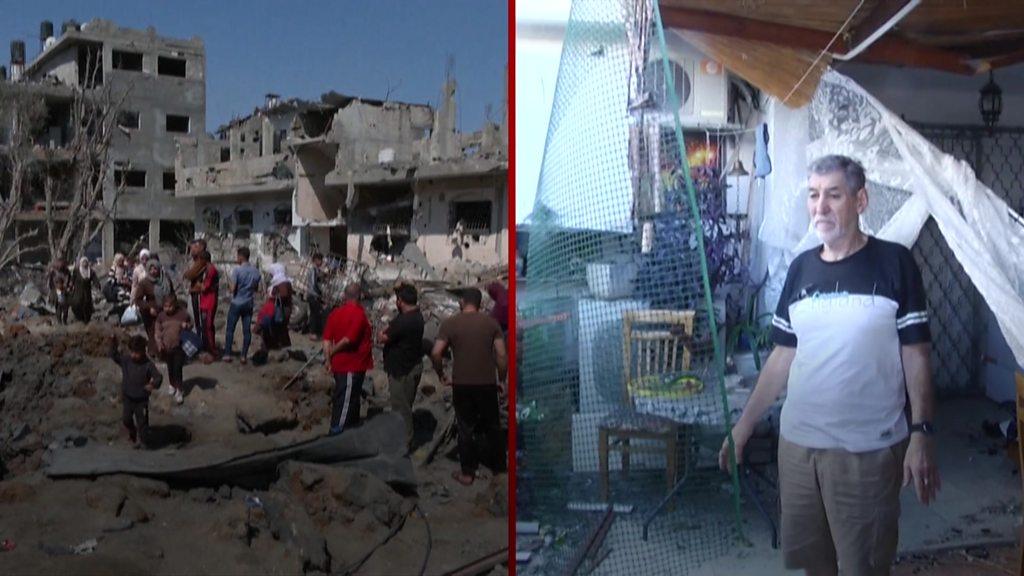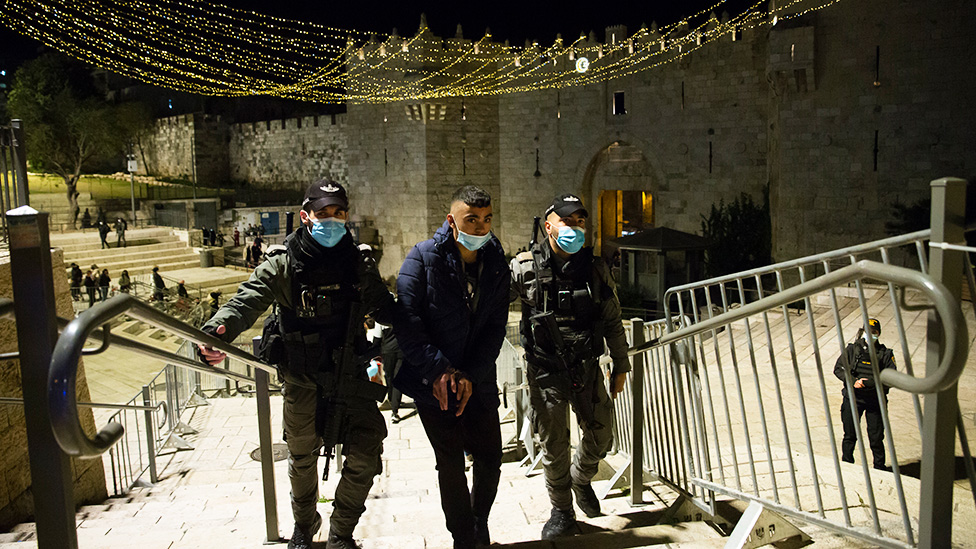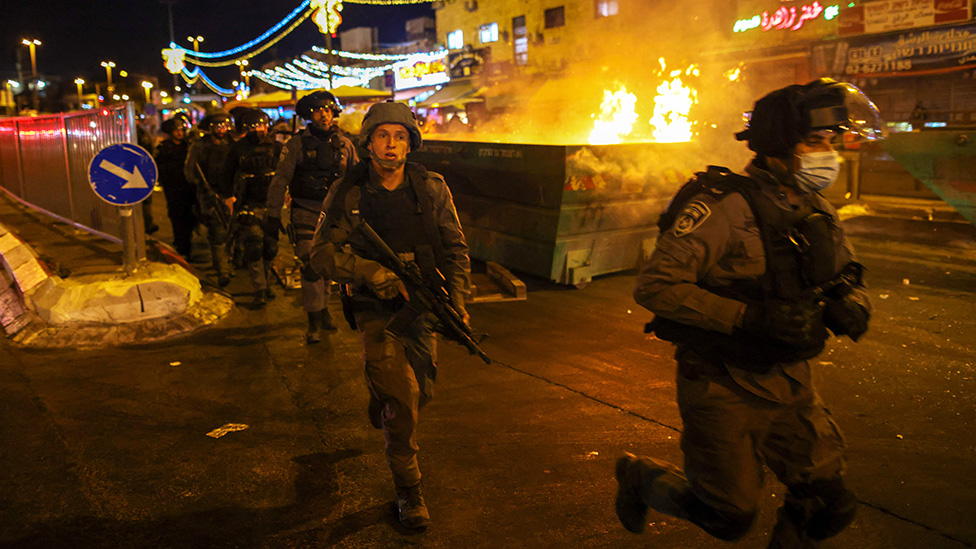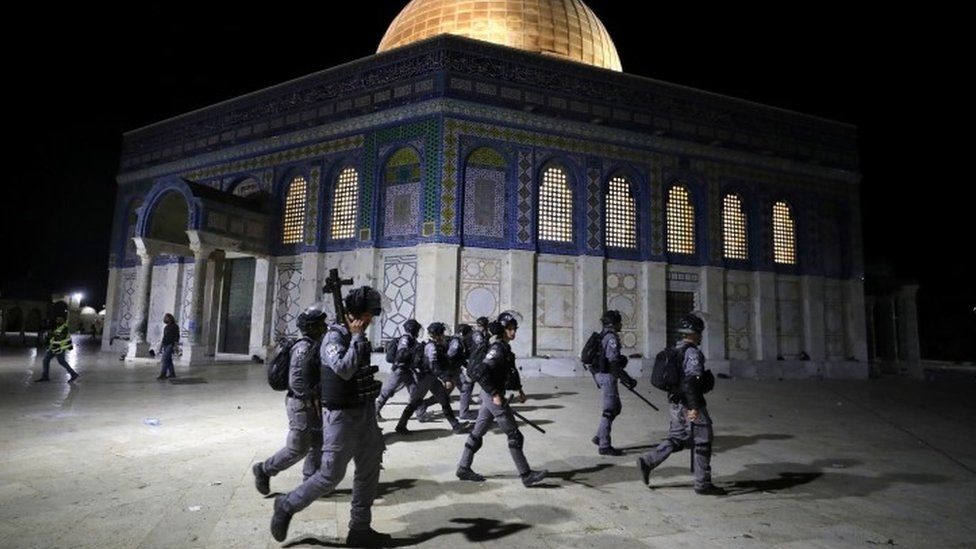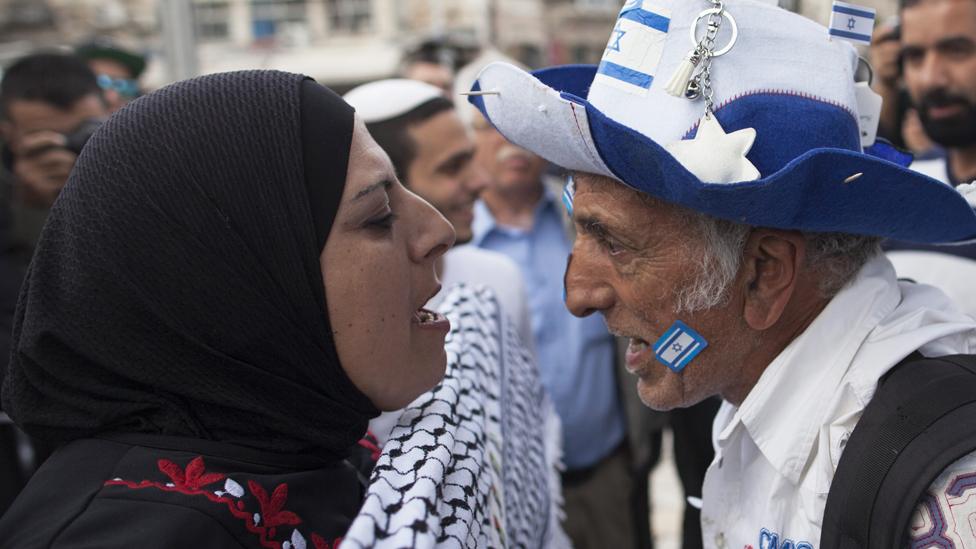Israel-Gaza: Biden tells Netanyahu he wants 'path to ceasefire'
- Published
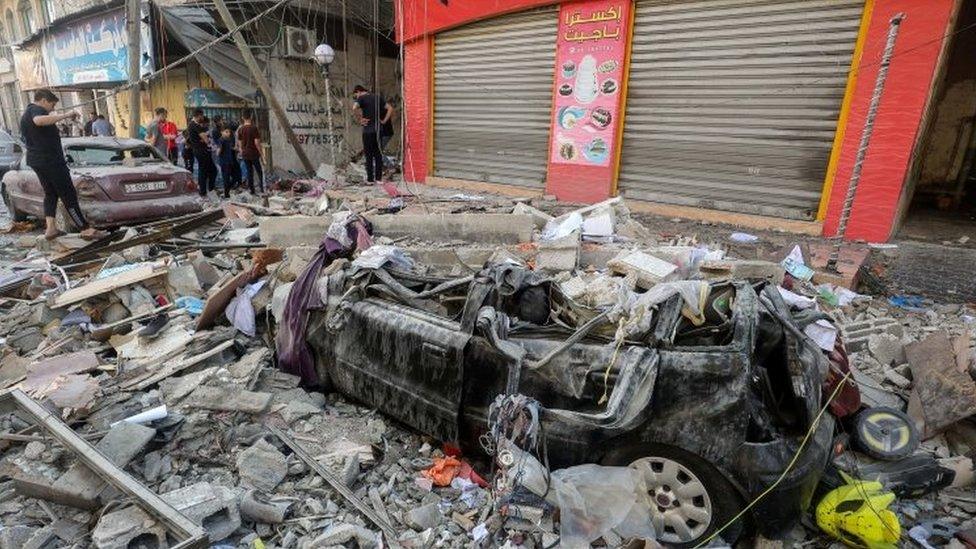
Damage from an Israeli air strike overnight in Gaza City
US President Joe Biden has told Israel's PM Benjamin Netanyahu he expects a "significant de-escalation" in the Gaza conflict on Wednesday.
Mr Biden wanted a "path to ceasefire", the White House said.
The US is a staunch ally of Israel and has so far opposed a joint UN Security Council statement on the conflict.
In response Mr Netanyahu said he was "determined to carry on" until "calm and security are restored to Israeli citizens", according to Israeli media.
The conflict is in its 10th day, with a continuing exchange of rocket fire from Palestinian militants into Israel and Israeli air strikes on Gaza.
On Wednesday, four rockets were also fired from Lebanon into Israel and Israel's military responded by firing artillery shells at "a number of targets in Lebanese territory". It was not immediately clear whether this would prove to be a significant escalation.
The Gaza fighting began after weeks of rising Israeli-Palestinian tension in occupied East Jerusalem that culminated in clashes at a holy site revered by both Muslims and Jews. Hamas, which controls Gaza, began firing rockets after warning Israel to withdraw from the site, triggering retaliatory air strikes.
At least 227 people, including more than 100 women and children, have been killed in Gaza so far, according to its health ministry. Israel has said at least 150 militants are among those killed in Gaza. Hamas does not give casualty figures for fighters.
In Israel 12 people, including two children, have been killed, its medical service says. Israel says some 4,000 rockets have been fired towards its territory by militants in Gaza.
Ceasefire moves stall
On Wednesday morning, Mr Biden held his fourth call with Mr Netanyahu since the conflict started.
A statement released by the White House, external said: "The president conveyed to the prime minister that he expected a significant de-escalation today on the path to a ceasefire."
Ex-UN rapporteur John Dugard: US is not honest broker in Israel-Gaza conflict
The US has called before for a truce but has held up any joint UN statement, saying it would not help with de-escalation.
The Palestinian representative at the UN, Riyad Mansour, called the Security Council's failure to express a unified position "shameful".
The latest bid for a council resolution calling for a ceasefire, launched by France, failed on Wednesday when the US said it could "undermine efforts to de-escalate".
One Israeli military source told Reuters that Israel was assessing whether conditions were right for a truce.
The Ynet news website said that the Israelis were talking with Egyptian mediators. It quoted sources in the Israeli cabinet as saying Israel could achieve its objectives and end the fighting "within days".
A Hamas leader said that efforts by mediators were "serious and continuous" but that Palestinian demands had to be met.
Earlier on Wednesday Mr Netanyahu did not appear ready to begin a truce.
He said there were "only two ways that you can deal with" Hamas. "You can either conquer them, and that's always an open possibility, or you can deter them, and we are engaged right now in forceful deterrence, but I have to say we don't rule out anything."
Assassination attempt
The Israel Defense Forces (IDF) said there had been renewed rocket fire from Gaza on Wednesday and that its fighter jets had attacked military infrastructure, including tunnels, and the homes of Hamas commanders.
The BBC's Rushdi Abualouf in Gaza said two Palestinian militants were killed in Gaza City, as dozens of strikes targeted both it and the southern city of Khan Younis.
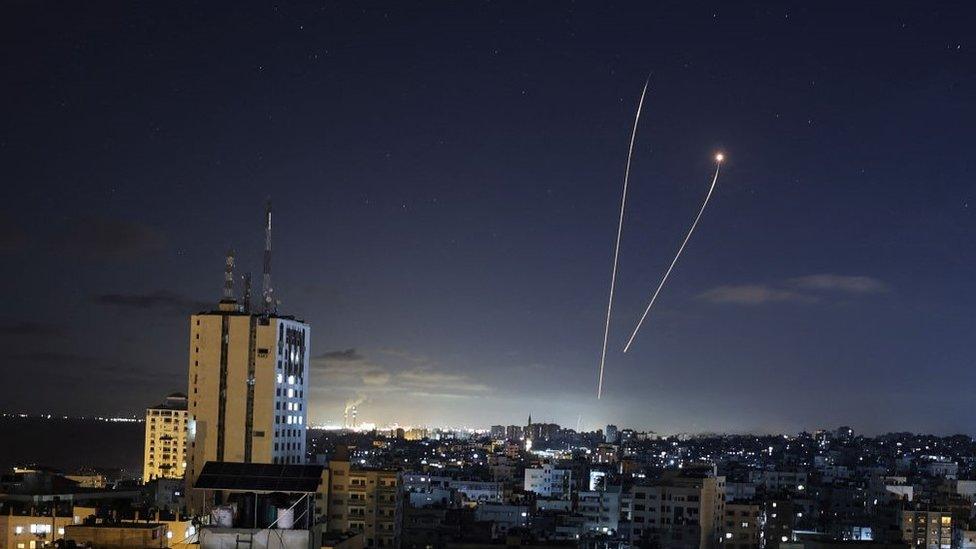
Israel's Iron Dome anti-missile system intercepted Palestinian rockets throughout the night
Gaza City mother of seven Randa Abu Sultan, 45, told AFP news agency: "My four-year-old son tells me he's scared that if he falls asleep, he'll wake up to find us dead."
IDF spokesman Brig Gen Hidai Zilberman said Israel had tried to assassinate Mohammed Deif, the head of Hamas's military wing, the Izzedine al-Qassam Brigades.
Mohammed Deif has survived repeated attempts on his life, including in the last major conflict in 2014. He tends to stay in the background and his whereabouts remain unknown.
Sirens sounded across much of south and central Israel on Wednesday.
Hamas also targeted an Israeli air base overnight but the IDF said no bases were hit.
Of the 3,750 rockets fired from the Gaza Strip since the fighting began, 550 have fallen short in Gaza, according to the IDF. Israel's Iron Dome missile defence system has intercepted about 90% of the rockets that have crossed into Israeli territory, it says.
The IDF estimated that at the start of the conflict, Hamas and Islamic Jihad, the two main groups in Gaza, had an arsenal of about 12,000 rockets or mortars.
Mr Netanyahu said the Israeli operation had "set Hamas back by many years".
There has also been unrest within Israel and in the occupied West Bank and East Jerusalem, where Palestinians took part in a general strike on Tuesday. There were clashes in several locations.
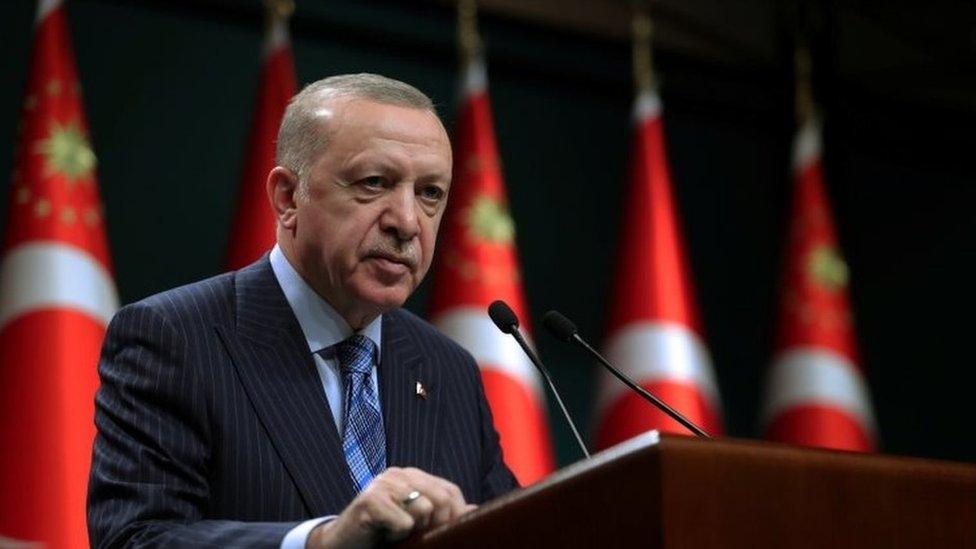
The party of Turkish President Erdogan rejected US accusations of anti-Semitism
Separately on Wednesday, Turkey rejected US accusations that President Recep Tayyip Erdogan had made anti-Semitic remarks about Israel.
He had accused Israel of "terrorism" against the Palestinians and recently said: "It is in their nature".
State department spokesman Ned Price said the US found the remarks "reprehensible".
Omer Celik, a spokesman for Mr Erdogan's party, said the president had given very strong messages against anti-Semitism, adding: "Accusing our president of anti-Semitism is an illogical and untrue approach. This is a lie."


Are you in Israel or Gaza and affected by the fighting? Share your experiences by emailing haveyoursay@bbc.co.uk, external.
Please include a contact number if you are willing to speak to a BBC journalist. You can also get in touch in the following ways:
WhatsApp: +44 7756 165803
Tweet: @BBC_HaveYourSay, external
Please read our terms & conditions and privacy policy
If you are reading this page and can't see the form you will need to visit the mobile version of the BBC website to submit your question or comment or you can email us at HaveYourSay@bbc.co.uk, external. Please include your name, age and location with any submission.
- Published18 May 2021
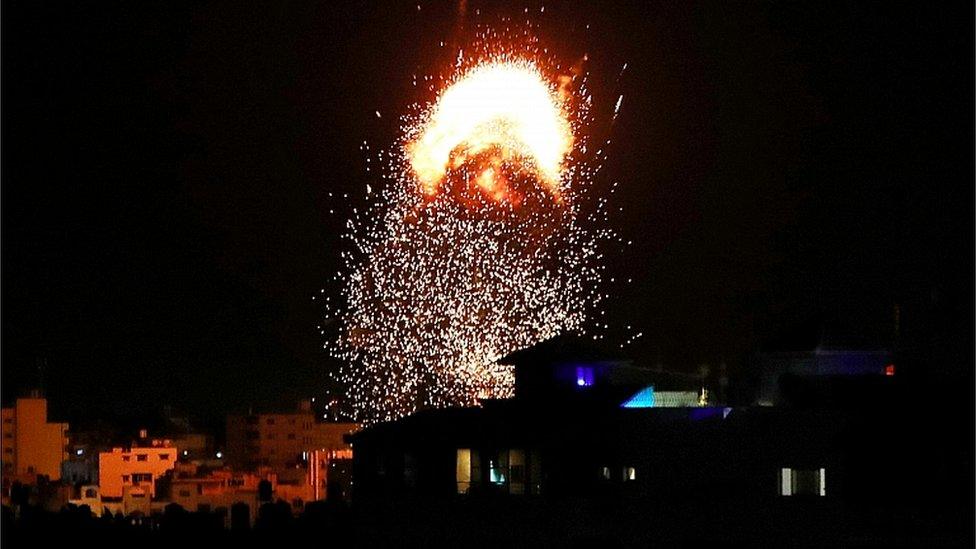
- Published17 May 2021
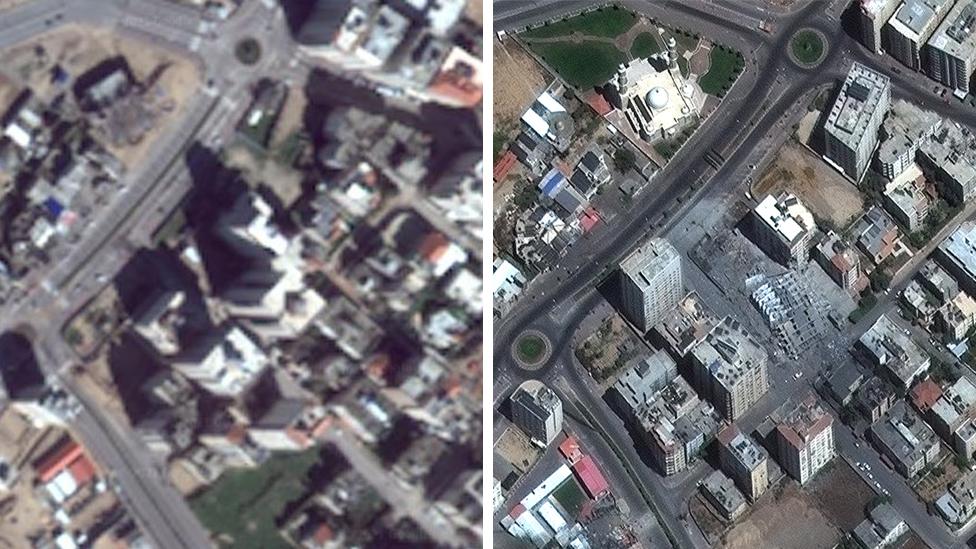
- Published16 May 2021
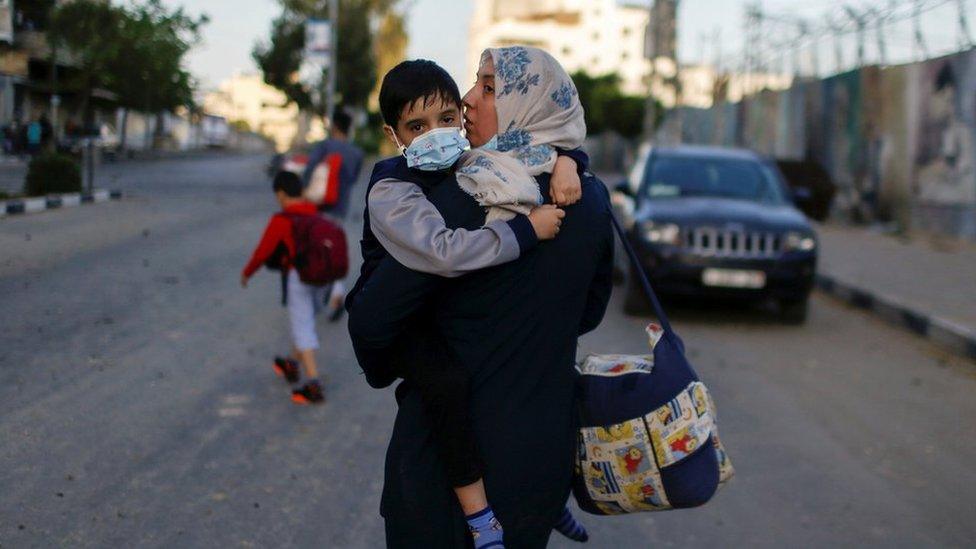
- Published15 May 2021
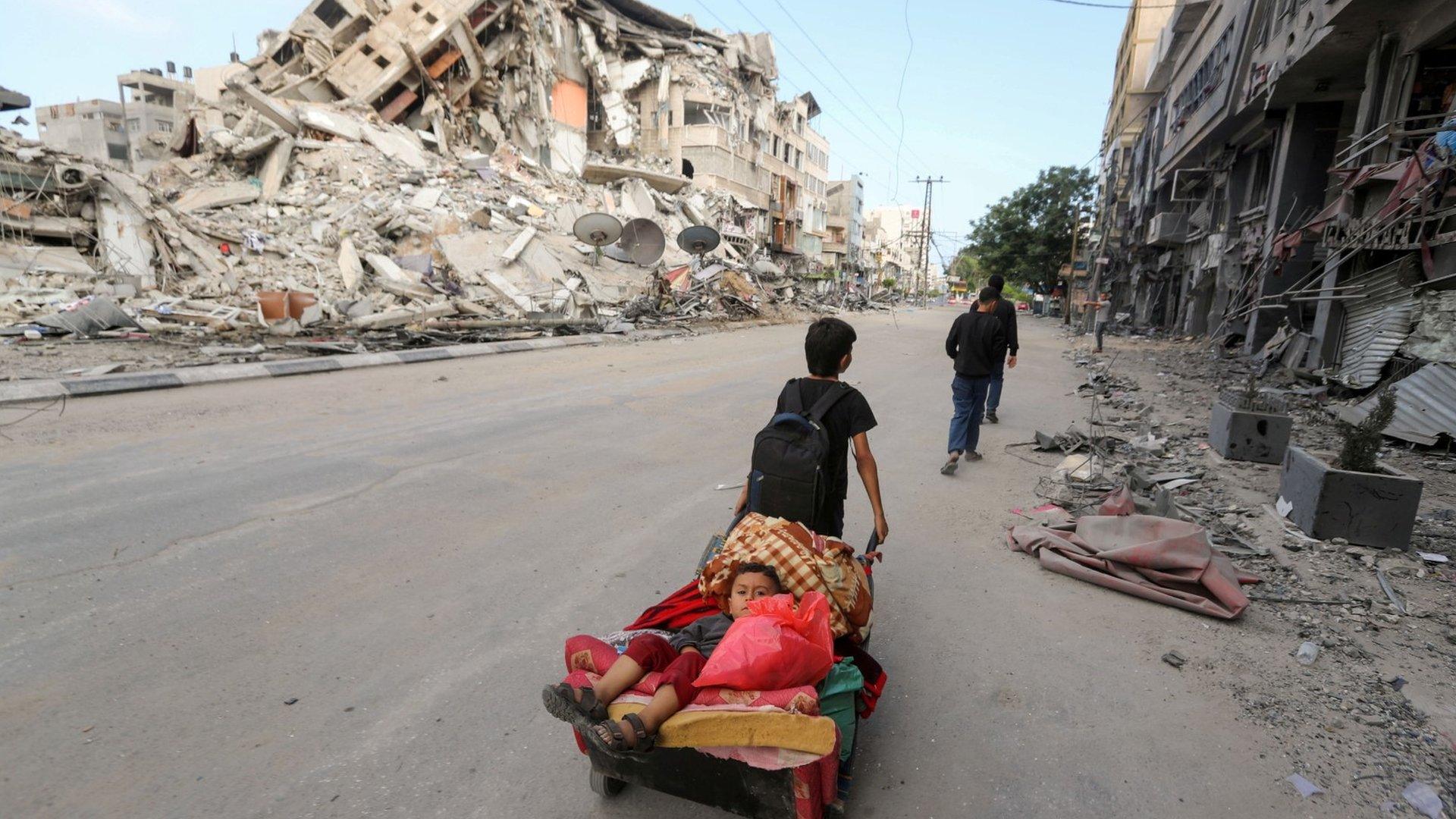
- Published14 May 2021
